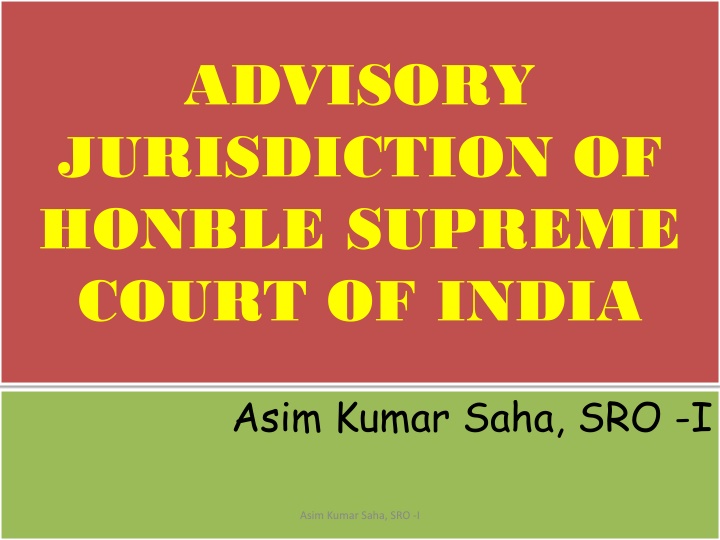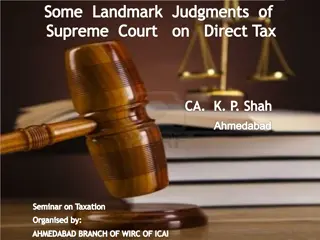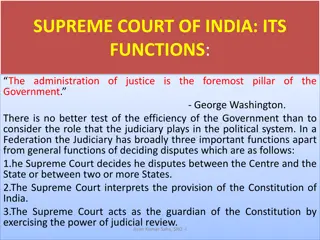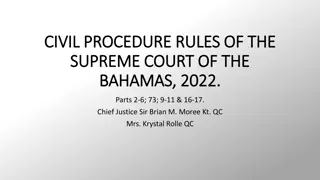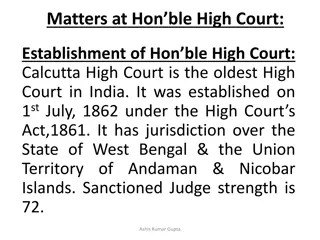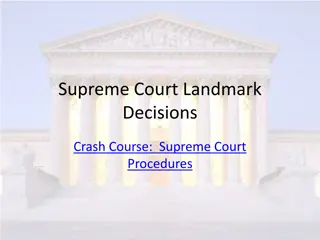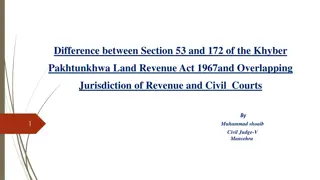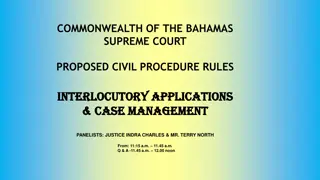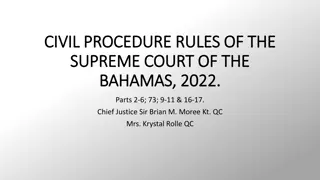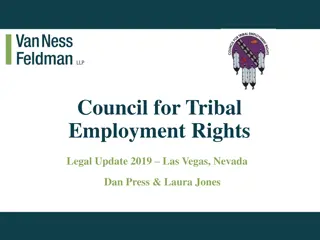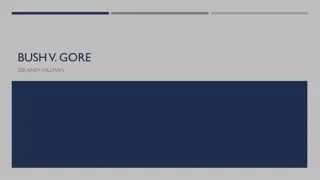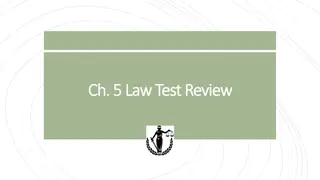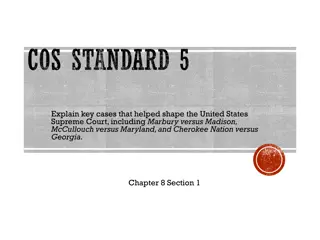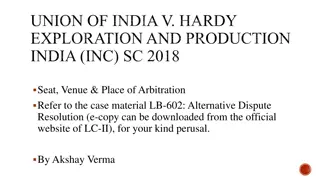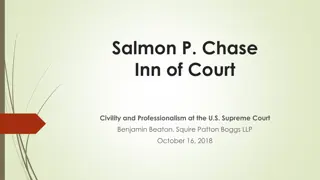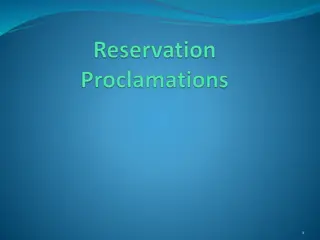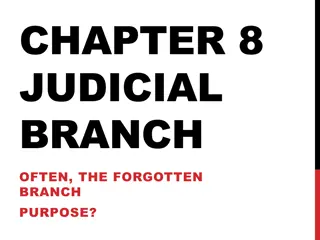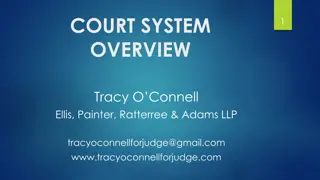Advisory Jurisdiction of Supreme Court of India
Most countries grant their apex courts original and appellate jurisdiction, but the Indian Constitution includes advisory jurisdiction for the Supreme Court. Article 143 allows the President to seek the Court's opinion on important public matters. The Court advises the President, although it's non-binding. This provision stems from historical legal statutes and has been utilized only a few times. The Court's advisory role complements its original and appellate jurisdictions.
Download Presentation

Please find below an Image/Link to download the presentation.
The content on the website is provided AS IS for your information and personal use only. It may not be sold, licensed, or shared on other websites without obtaining consent from the author.If you encounter any issues during the download, it is possible that the publisher has removed the file from their server.
You are allowed to download the files provided on this website for personal or commercial use, subject to the condition that they are used lawfully. All files are the property of their respective owners.
The content on the website is provided AS IS for your information and personal use only. It may not be sold, licensed, or shared on other websites without obtaining consent from the author.
E N D
Presentation Transcript
ADVISORY JURISDICTION OF HONBLE SUPREME COURT OF INDIA Asim Kumar Saha, SRO -I Asim Kumar Saha, SRO -I
1 Most of the countries of the world have vested in the apex court original and appellate jurisdiction. But our Constitution has in addition granted to the Supreme Court advisory jurisdiction. Article 143 of the Constitution confers Advisory Jurisdiction to the Supreme Court of India. This provision finds its origin in Section 213 of the Government of India Act, 1935, which conferred upon the Governor General the discretion to pose questions of public importance to the Federal Court. Similarly, as per Article 143 the President has the power to address questions to the Supreme Court, which he deems important for public welfare. Asim Kumar Saha, SRO -I
1 The Supreme Court advises the President by answering the query put before it. Till date this mechanism has been put to use only twelve times. However, it is pertinent to note that this is not binding on the President, nor is it law declared by the Supreme Court , hence not binding on subordinate courts. That are (1) Original Jurisdiction (2) Appellate Jurisdiction and (3) ADVISORY JURISDICTION 1) Original Jurisdiction (2) Appellate Jurisdiction in addition to reference case records , the remaining one to be discussed by me. Asim Kumar Saha, SRO -I
1 Before , initiating discussion We can go through the Art.143 of the Constitution of India Article 143. Power of President to consult Supreme Court. (1) If at any time it appears to the President that a question of law or fact has arisen, or is likely to arise, which is of such a nature and of such public importance that it is expedient to obtain the opinion of the Supreme Court upon it, he may refer the question to that Court for consideration and the Court may, after such hearing as it thinks fit, report to the President its opinion thereon. Asim Kumar Saha, SRO -I
1 (2) The President may, notwithstanding anything in the proviso to article 131, refer a dispute of the kind mentioned in the [said proviso] to the Supreme Court for opinion and the Supreme Court shall, after such hearing as it thinks fit, report to the President its opinion thereon. Article 143 of the Indian Constitution confers upon the Supreme Court advisory jurisdiction. The President may seek the opinion of the Supreme Court on any question of law or fact of public importance on which he thinks it expedient to obtain such an opinion. Asim Kumar Saha, SRO -I
1 On such reference from the President, the Supreme Court, after giving it such hearing as it deems fit, may report to the President its opinion thereon. The opinion is only advisory, which the President is free to follow or not to follow. (Keshav Singh s Case, AIR 1965 SC 745). However, even if the opinion given in the exercise of advisory jurisdiction may not be binding, it is entitled to great weight. The first reference under Article 143 was made in the Delhi Laws case, (1951) SCR 747. In almost sixty years, only twelve references have been made under Article 143 of the Constitution by the President for the opinion of the Supreme Court which are being mentioned hereunder:- Asim Kumar Saha, SRO -I
1 ADVISORY JURISDICTION Article 143 of the Indian Constitution confers upon the Supreme Court advisory jurisdiction. The President may seek the opinion of the Supreme Court on any question of law or fact of public importance on which he thinks it expedient to obtain such an opinion. On such reference from the President, the Supreme Court, after giving it such hearing as it deems fit, may report to the President its opinion thereon. The opinion is only advisory, which the President is free to follow or not to follow. (Keshav Singh s Case, AIR 1965 SC 745). However, even if the opinion given in the exercise of advisory jurisdiction may not be binding, it is entitled to great weight. Asim Kumar Saha, SRO -I
1 The first reference under Article 143 was made in the Delhi Laws case, (1951) SCR 747. In almost sixty years, only twelve references have been made under Article 143 of the Constitution by the President for the opinion of the Supreme Court: In re the Delhi Law Act, AIR 1951 SC 332 In re the Kerala Education Bill, AIR 1958 SC 956 In re New India Motors Ltd. v. Morris, AIR 1960 SC 875 In re Berubari (Indo-Pakistan Agreements), AIR 1960 SC 845 In re the Sea Customs Act, AIR 1963 SC 1760 Asim Kumar Saha, SRO -I
1 In re Keshav Sing s Case, AIR 1965 SC 745 In re Presidential Poll, AIR 1974 SC 1682 In re Special Courts Bill, AIR 1979 SC 478 Re in the matter of Cauvery Water Dispute Tribunal, AIR 1992 SC 522 Re in the matter of Ram Janamabhoomi, (1993) 1 SCC 642 Re on Principles and Procedure regarding appointment of Supreme Court and High Court Judges, AIR 1999 SC 1 Gujarat Assembly Election Matter, AIR 2003 SC 87 Asim Kumar Saha, SRO -I
1 JUDICIAL INTERPRETATION Article 143 is not part of administration of justice. It is part of an advisory machinery designed to assist the President (the Executive). Article 143(1) is couched in broad terms which provide that any question of law or fact may be referred by the President for the consideration of the Supreme Court. The Supreme Court has held in In the Kerala Education Bill, 1957 that the use of the word may in Article 143(1), in contradiction to the use of the word shall in Article 143(2) shows that whereas in a reference under Article 143(2) the Supreme Court is under an obligation to answer the questions put to it, under Article 143(1) it is discretionary for the Supreme Court to answer or not to answer the questions put to it. Asim Kumar Saha, SRO -I
The Presidents reference under Article 143(1) to the Supreme Court in In re The Special Courts Bill1978 ( the special courts reference) raised important questions of constitutional law. The facts giving rise to the Special Courts Reference were briefly these: When the former Prime Minister, Mrs. Indira Gandhi revoked the emergency after her defeat in the 1977 Parliamentary elections, the overwhelming demand arose in the country for the punishment of Mrs. Gandhi, her son Sanjay and other guilty men. The investigations of the Shah Commission left no doubt that there had been grave abuse of power during the emergency. Justice to countless victims of the Emergency demanded that the guilty should be brought to trial. However, the ordinary process of law are dilatory and Mrs. Gandhi s party made no secret that the weapon of delay would be used to prevent the guiltymen from being brought to speedy trial. 1 Asim Kumar Saha, SRO -I
1 Consequently, a private member, Mr. Ram Jethmalani, introduced in the House of the People (Lok Sabha) a Bill for the setting up of Special Courts. On 1 August, 1978 the President acting under Article 143, referred the following questions for the opinion of the Supreme Court. (1) Whether the Bill or any of the provisions thereof, if enacted, would be constitutionally invalid. (2) The nature of the Supreme Court s power under Article 143(1) and whether the law laid down in the opinions is the law laid down by the Supreme Court under Article 141. Asim Kumar Saha, SRO -I
1 While dealing the above question, CHANDRACHUD C.J. said that the question whether the law laid down in the opinions was law declared by the Supreme Court would require to be considered more fully on a future occasion. He observed that: It would be strange that a decision given by this Court on a question of law in a dispute between two private parties should be binding on all courts in this country but the advisory opinion should bind no one at all, even if, as in the instant case, it is given after issuing notice to all interested parties, after hearing everyone concerned. Asim Kumar Saha, SRO -I
1 He was aware that Supreme Court decisions had held that it was not law within Article 141, but he supported the need for future consideration. Article 143 does not deal with jurisdiction of Supreme Court but with the power of the President. It does not refer to any adjudication at all, but with consultation. There is to be no judgement, decree or order; there is to be Opinion to be forwarded to the President in a report to him. The Supreme Court itself would however remain free to re-examine and if necessary to overrule the view taken in an opinion under Article 143(1). It was held in Cauvery Water Disputes Tribunal 1992, that the jurisdiction under Article 143(1) cannot be used to reconsider any of its earlier decisions. This can be done only under Article 137 of the Constitution Asim Kumar Saha, SRO -I
Merits & Demerits. According to some political thinkers and noted Jurists it is undesirable to highest court into a consultative department of the Executive department of the Executive Organ. They said that the courts are created t settle the legal disputes- they should pronounce verdicts not offer opinions. So they should not pronounce any opinion unless the matter comes as concrete litigation. Moreover, they believe that if the courts give their opinion in the abstract questions, the interests of future litigations may be prejudiced. Secondly, Art. 143 has empowered the President with the right to send any matter of law or fact to the Supreme Court for its advice . If a political question is referred to the Supreme Court, it would involve the judiciary in politics. It do not augur well for a democracy which seeks to establish the doctrine of judicial independence. 1 Asim Kumar Saha, SRO -I
1 Pertinent to state that the Court does not give the opinion in sumotto but opinion is given as and when is sought for by the President. So it is desirable that it should be respectfully submitted by the President. But the fact is that the President is not bound by the advisory jurisdiction and from the point of view of that it is inconsistent with and derogatory to the status of the Supreme Court. Moreover, there is a cabinet to give the President advice which is binding in character. If the judicial opinion and cabinet opinion differ, the president would be in a fix. Needless to say, after the 42nd amendment the President is bound by the advice of the cabinet. Asim Kumar Saha, SRO -I
1 Having discussions, it is undeniable fact that the Govt., had been highly benefitted by the judicial advice. That is why Mr. D D Basu the eminent Commentator has observed that The chief utility of such advisory judicial opinion is to enable the Govt. to secure an opinion is to enable the Govt. to secure an authoritative opinion either as to the validity of the legal measures before it is enacted or as to some matter which may not come to the Courts in the ordinary course and yet the Government is anxious to have authoritative legal opinion Asim Kumar Saha, SRO -I due weigh to the aforementioned
From all these cases interpreted by the Apex Court, we came to conclusion that Article 143 empowers the President to make references to Supreme Court on any matters but it cannot be said as the Jurisdiction of Supreme Court. Now it is on court to examine whether it should be answered or not, if not with valid reasons. However, the views taken by the Court is not binding on the President. Till now, the twelve references have been made by the President some of them have been discussed through this paper. It was also held by the Supreme Court that the references made under this Article are not the law declared by the Supreme Court under Article 141 of the Constitution. So it is not binding on inferior courts, even though have high persuasive value. In fine, it can be stated that the merits of Art.143 immensely outweigh its defects. It helps the Govt to take wise decision in ties of confusion and saves it from involving in unnecessary legal entanglement. 1 Asim Kumar Saha, SRO -I
A BRIEF DISCUSSIONS AS REARDS DISMISSAL OF SLP AT THRESHOLD. You have already got an idea as regards filing of SLP , when it is filed and under which Articles SLP it is filed in the Apex Court. Sometimes it appears petition is filed seeking Special Leave to Appeal in the Supreme Court but Supreme Court has been pleased to dismiss the petition at the threshold. Pertinent to state that it may be dismissed for several reasons;- As barred by time (ii) being a defective presentation (iii) the petitioner having (iv) the question raised by the petitioner for consideration by this court being not fit for consideration or deserving being dealt with by the Apex Court of the country and so on. 1 Asim Kumar Saha, SRO -I
The expression employed by the Apex Court while disposing of such petitions are Heard and dismissed Dismissed Dismissed as barred by time and so on. Mere dismissal of the petition seeking Special Leave to appeal by a non-speaking order where no reasons have been assigned and no law has been declared by the Supreme Court. The dismissal is not of the appeal \but of the special leave petition. Even if the merits have been gone into, they are the merits of the special leave petition only. In our opinion neither doctrine of merger nor Article 141 of the Constitution is attracted to such an order. Grounds entitling exercise of review jurisdiction conferred by Order 47 Rule 1 of the C.P.C. or any other statutory provision or allowing review of an order passed in exercise of writ or supervisory jurisdiction of the High Court (where also the principles underlying or emerging from Order 47 Rule 1 of the C.P.C. act as guidelines) are not necessarily the same on which this court exercises discretion to grant or not to grant special leave to appeal while disposing of a petition for the purpose. 1 Asim Kumar Saha, SRO -I
1 Mere rejection of special leave petition does not take away the jurisdiction of the court, tribunal or forum whose order forms the subject matter of petition for special leave to review its own order if grounds for exercise of review jurisdiction are shown to exist. Where the order rejecting an SLP is a speaking order, that is, where reasons have been assigned by this Court for rejecting the petition for special leave and are stated in the order still the order remains the one rejecting prayer for the grant of leave to appeal. The petitioner has been turned away at the threshold without having been allowed to enter in the appellate jurisdiction of this Court. Here also the doctrine of merger would not apply. But, the law stated or declared by this Court in its order shall attract applicability of Article 141 of the Constitution. Asim Kumar Saha, SRO -I
1 The reasons assigned by this Court in its order expressing its adjudication (expressly or by necessary implication) on point of fact or law shall take away the jurisdiction of any other court, tribunal or authority to express any opinion in conflict with or in departure from the view taken by this Court because permitting to do so would be subversive of judicial discipline and an affront to the order of this Court. Once a special leave petition has been granted, the doors for the exercise of appellate jurisdiction of this Court have been let open. The order impugned before the Supreme Court becomes an order appealed against. Any order passed thereafter would be an appellate order and would attract the applicability of doctrine of merger. Asim Kumar Saha, SRO -I
It would not make a difference whether the order is one of reversal or of modification or of dismissal affirming the order appealed against. It would also not make any difference if the order is a speaking or non- speaking one. Whenever this Court has felt inclined to apply its mind to the merits of the order put in issue before it though it may be inclined to affirm the same, it is customary with this Court to grant leave to appeal and thereafter dismiss the appeal itself (and not merely the petition for special leave) though at times the orders granting leave to appeal and dismissing the appeal are contained in the same order and at times the orders are quite brief. Nevertheless, the order shows the exercise of appellate jurisdiction and therein the merits of the order impugned having been subjected to judicial scrutiny of this Court. 1 Asim Kumar Saha, SRO -I
To merge means to sink or disappear in something else; to become absorbed or extinguished; to be combined or be swallowed up. Merger in law is defined as the absorption of a thing of lesser importance by a greater, whereby the lesser ceases to exist, but the greater is not increased; an absorption or swallowing up so as to involve a loss of identity and individuality. We may look at the issue from another angle. The Supreme Court cannot and does not reverse or modify the decree or order appealed against while deciding a petition for special leave to appeal. What is impugned before the Supreme Court can be reversed or modified only after granting leave to appeal and then assuming appellate jurisdiction over it. If the order impugned before the Supreme Court cannot be reversed or modified at the SLP stage obviously that order cannot also be affirmed at the SLP stage. 1 Asim Kumar Saha, SRO -I
In Supreme Court Employees Welfare Associations case (supra), this Court held When Supreme Court gives reasons while dismissing a special leave petition under Article 136 the decision becomes one which attracts Article 141. But when no reason is given and the special leave petition is summarily dismissed, the Court does not lay down any law under Article 141. The effect of a non-speaking order of dismissal of a special leave petition without anything more indicating the grounds or reasons of its dismissal must, by necessary implication, be taken to be that the Supreme Court had decided only that it was not a fit case where special leave petition should be granted. Leave granted - dismissal without reasons - merger results It may be that in spite of having granted leave to appeal, the Court may dismiss the appeal on such grounds as may have provided foundation for refusing the grant at the earlier stage. But that will be a dismissal of appeal. 1 Asim Kumar Saha, SRO -I
1 To sum up our conclusions are :- (i) Where an appeal or revision is provided against an order passed by a court, tribunal or any other authority before superior forum and such superior forum modifies, reverses or affirms the decision put in issue before it, the decision by the subordinate forum merges in the decision by the superior forum and it is the latter which subsists, remains operative and is capable of enforcement in the eye of law. ii) The jurisdiction conferred by Article 136 of the Constitution is divisible into two stages. First stage is upto the disposal of prayer for special leave to file an appeal. The second stage commences if and when the leave to appeal is granted and special leave petition is converted into an appeal. Asim Kumar Saha, SRO -I
1 (iii) Doctrine of merger is not a doctrine of universal or unlimite application. It will depend on the nature of jurisdiction exercised by the superior forum and the content or subject-matter of challenge laid or capable of being laid shall be determinative of the applicability of merger. The superior jurisdiction should be capable of reversing, modifying or affirming the order put in issue before it. Under Article 136 of the Constitution the Supreme Court may reverse, modify or affirm the judgment-decree or order appealed against while exercising its appellate jurisdiction and not while exercising the discretionary jurisdiction disposing of petition for special leave to appeal. The doctrine of merger can therefore be applied to the former and not to the latter. Asim Kumar Saha, SRO -I
1 iv) An order refusing special leave to appeal may be a non- speaking order or a speaking one. In either case it does not attract the doctrine of merger. An order refusing special leave to appeal does not stand substituted in place of the order under challenge. All that it means is that the Court was not inclined to exercise its discretion so as to allow the appeal being filed. v) If the order refusing leave to appeal is a speaking order, i.e. gives reasons for refusing the grant of leave, then the order has two implications. Firstly, the statement of law contained in the order is a declaration of law by the Supreme Court within the meaning of Article 141 of the Constitution. Asim Kumar Saha, SRO -I
1 Secondly, other than the declaration of law, whatever is stated in the order are the findings recorded by the Supreme Court which would bind the parties thereto and also the court, tribunal or authority in any proceedings subsequent thereto by way of judicial discipline, the Supreme Court being the apex court of the country. But, this does not amount to saying that the order of the court, tribunal or authority below has stood merged in the order of the Supreme Court rejecting special leave petition or that the order of the Supreme Court is the only order binding as res judicata in subsequent proceedings between the parties. Asim Kumar Saha, SRO -I
1 (vi) Once leave to appeal has been granted and appellate jurisdiction of Supreme Court has been invoked the order passed in appeal would attract the doctrine of merger; the order may be of reversal, modification or merely affirmation. (vii) On an appeal having been preferred or a petition seeking leave to appeal having been converted into an appeal before Supreme Court the jurisdiction of High Court to entertain a review petition is lost thereafter as provided by sub-rule (1) of Rule (1) of Order 47 of the C.P.C. Asim Kumar Saha, SRO -I
1 THANK YOU ALL Asim Kumar Saha, SRO -I
